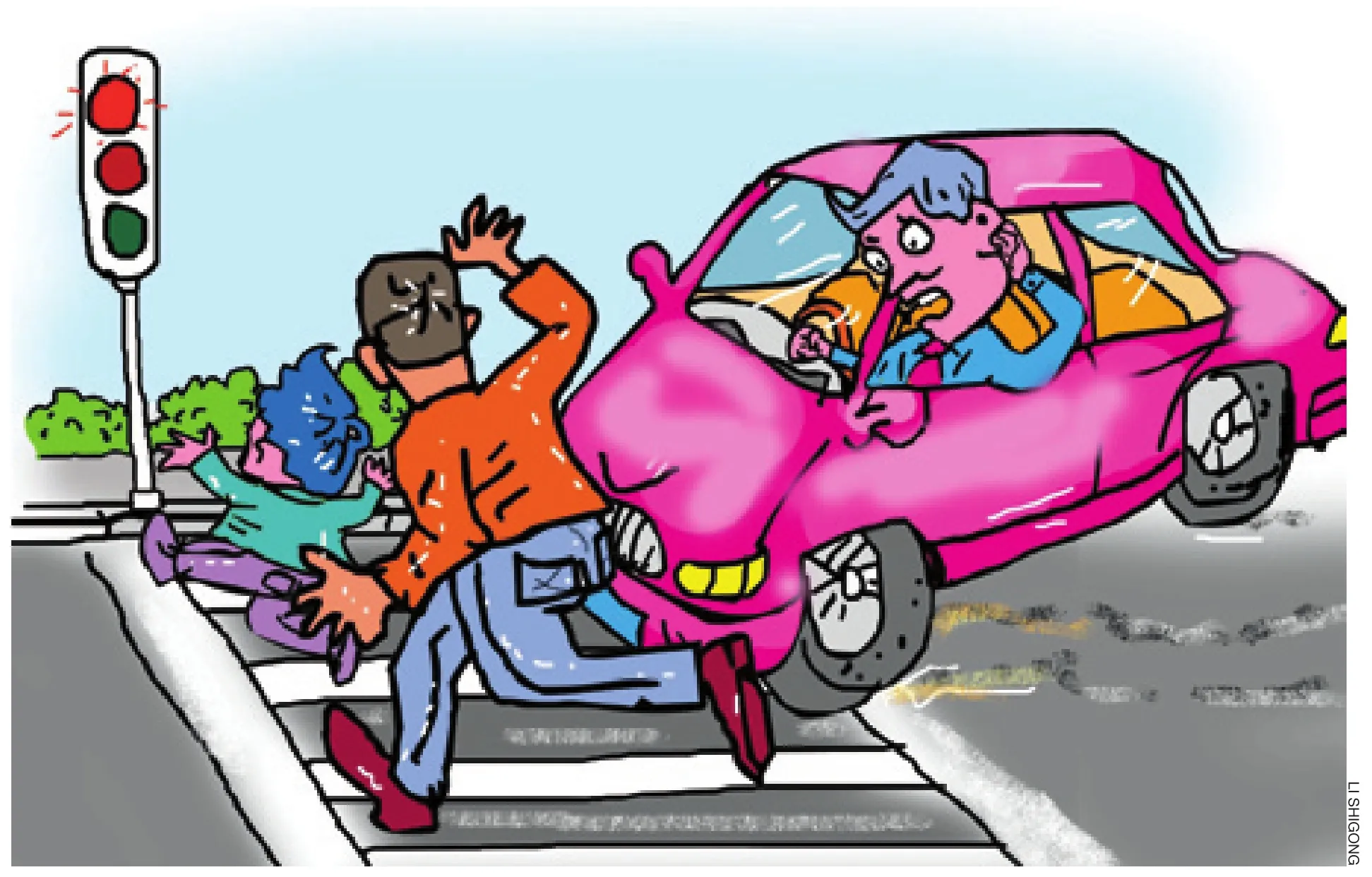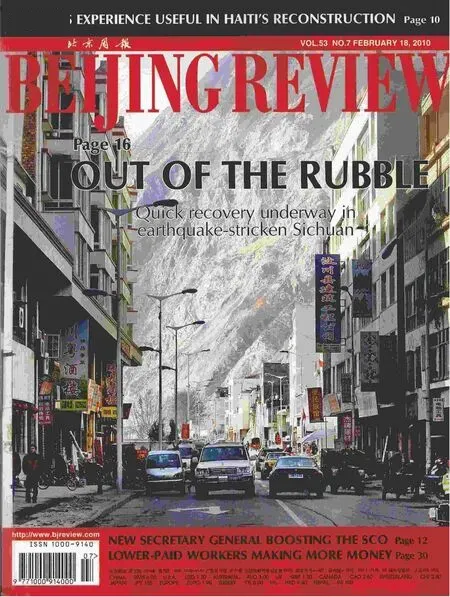Who Is Responsible for Pedestrian Accidents?
If pedestrians or bicyclists cross a busy street against traffic rules, they can be difficult for drivers to avoid. This situation often results in an accident. Who should be responsible?
In April 2009, two people in southwest China’s Chongqing crossed a street forbidden to pedestrians to save time even though an overpass was within 100 meters.Unfortunately, Mr. Zhang, a drunken motorcycle driver, in trying to avoid them lost control of his vehicle, resulting in his death.His family went to court to request compensation of 100,000 yuan ($15,000) from the pedestrians. A local court later ruled the pedestrians had to pay 20,000 yuan ($3,000)apiece. The decedent’s family attorney this January wrote to the National People’s Congress, China’s top legislature, suggesting that accidents caused by pedestrians crossing roads illegally should be the pedestrians’responsibility, and they should be convicted of endangering public safety.
This proposal has become controversial.
Proponents believe implementing the“pedestrian first” principle does not necessarily mean pedestrians who cross roads are not guilty or shouldn’t take responsibility if they cause traf fi c accidents. In a society ruled by law, anyone who commits a crime should be convicted. The current Road Transportation Safety Law says blameless drivers should be liable for no more than 10 percent of the total compensation payment, but this stipulation is meant to strengthen protection for pedestrians—who are often exposed to greater safety risks and not to clear them of blame. So if a pedestrian causes an accident, he or she should be responsible under criminal law.
People against the lawyer’s proposal say most victims in traf fi c accidents are pedestrians. There are few precedents where drivers are the victims or even suffer in a domino crash caused by a pedestrian. Investigations have shown, in most traf fi c accidents, drivers are exhausted, drunk, careless or speeding.Therefore, most of these accidents can be avoided. So, without effective methods to regulate drivers’ behavior, it is not right to hold pedestrians involved in traf fi c accidents criminally responsible.
No excuse for law breakers
He Hongbing (hlj.rednet.cn):Compared to vehicles, pedestrians are the vulnerable ones. But that does not provide good reason for arbitrary street crossings. If pedestrians are not mentally disabled, they are of course clear about possible risks. If they knowingly break the law and cause casualties, there is no excuse for them to escape legal sanctions.
At the end of 2009, Chengdu Evening News (a publication in southwest China’s Sichuan Province) began to recruit volunteers to dissuade rule-breaking pedestrians.This initiative was approved of by most local residents, and included drivers who had experienced these types of accidents.Sometimes, moral guidance may prove effective in rectifying malpractice in society,such as traf fi c offenses. But it is not enough.If we want to solve the problems completely,tough measures must be taken. Only the law can restrict the unscrupulous and stubborn.
Li Guohui (Daily News): Faced suddenly with pedestrians, vehicle drivers have little time to react. If arbitrary street crossings are sanctioned legally, there will be fewer people rushing across streets in the future.

Certainly, different people have different ways of thinking, but a perfect transport system is a major symbol of a highly developed society. To avoid a situation where “vehicles are mounting sidewalks and pedestrians have to cross highways,” the two parties should cooperate more effectively. And obeying the law will make the traf fi c environment more smooth and orderly. For this purpose, legal punishment on rule-breaking pedestrians are necessary.
Yunshui Chanxin (cnhubei.com): In China, major casualties and losses caused by pedestrian violations are frequent. Of course, an increase in the number of private cars makes streets more crowded. But a major problem is that laws now only prescribe pedestrians’ civil liabilities, not penal liabilities. This makes for more careless, even intentional rule-breaking by pedestrians...and major traf fi c accidents.
Also, laws in China are too favorable to pedestrians. So far, no matter whether or not a pedestrian killed in a traf fi c accident should be blamed, the families of the dead receive compensation. This inadvertently leads to ignorance of traf fi c laws because people think an accident must be the driver’s fault. As a result, pedestrians run red lights or cross streets forbidden to them without hesitation,not even waiting for a few seconds.
Most people are fully aware that arbitrary pedestrian street crossings are very likely to cause heavy casualties. If they are still unwilling to restrict their behavior, it already constitutes a legal ingredient of the crime of endangering public safety in accordance with the Criminal Law. So making rule-breaking pedestrians criminally responsible for casualties and economic losses caused by their acts is a good way to raise pedestrians’ consciousness of road safety and eliminate hidden risks.
Li Kejie (Yanzhao Metropolis Daily): I notice some people are trying to change the subject concerning rule-breaking pedestrians’legal liabilities into an argument about the gap between the poor and the rich, claiming that legal sanctions will shield the rich because the poor have to give way. This opinion is irrational and not in accordance with social reality. It also goes against the principle of equality before the law. Regardless of the fact that not all vehicle owners are rich,and not all vehicles fl aunt wealth, the logic in such sayings is completely wrong. The poor and the vulnerable also break the law.Paradoxically, this kind of thinking does not protect pedestrians, but represents potential danger to them.
Pedestrians vulnerable
Xiu Yangfeng (cnhubei.com): I have searched the Internet and found there are only few cases where pedestrians have caused casualties. One example was a man in Shanghai who crossed a street and brought on a tragedy where a motorcyclist ran into a truck in 2006. It was the first reported case of a pedestrian causing another’s death in China.
My finding shows such accidents happen only infrequently. Therefore, should we rewrite relevant legal stipulations just for a rare event? Is it rational and legitimate? For instance, it is the same not removing all the telegraph poles in a city just because one caused a pedestrian’s death.
I don’t want to embarrass the lawyer who made the proposal. I just want to stress that we should not exaggerate the harm of pedestrians’ road abuse. Arbitrary street crossings are not that civilized; legally, we should give those offenders the punishment they deserve. But criminal responsibility is too much. I’m afraid it will make pedestrians more vulnerable.
Compared to the threat of high-speed vehicles, pedestrians do little harm to drivers.
While an “auto society” is coming, I strongly believe that pedestrians should shoulder least responsibility for what happens on roads. So the media and law enforcement departments should pay more attention to restrictions on vehicles.
Wang Xuetang (Yangcheng Evening News): Can legal punishment stop rulebreaking pedestrians? It’s quite dif fi cult!
On one hand, most people know that arbitrary street crossings are against traffic rules. But just the same as drunken drivers,they have a sense of chance.
Laws have both the functions of education and punishment, and punishment is just one method of education. For instance, some migrant workers do not adjust to complicated urban transport systems well, and they may think it is acceptable to cross streets at will.Of course, they are breaking the law, but it is understandable.
The most important reason is that most pedestrians do not fully predict the harm of their violation. In such cases, the blameworthy pedestrians often end up injured or even dead. Therefore, they can hardly shoulder any legal liability. If a driver hits a pedestrian crossing a street illegally, should the dead pedestrian still pay for the driver’s loss?
Laws cannot solve every problem. If we want to solve the problem of arbitrary street crossings, a lot more work should be done to raise people’s awareness of risk and improve road safety facilities.
Guo Wenjing (Yangcheng Evening News): In most countries in the world, rulebreaking pedestrians do not have to take criminal responsibility for causing traffic accidents. Most of them are punished by administrative punishment or a mark against their credit record. Singapore is one of a few exceptions, where first-time violators of street crossing rules will be fined and those violate the rules more than once will be sentenced to imprisonment of six months to a year.
But we should take note of the fact that Singapore has a unique road culture in that it generally keeps the use of highways for vehicles and pedestrians balanced. First, it builds zebra crossings and sidewalks reasonably to make people’s crossing more convenient. Second, time limits for traffic lights are intelligent, and red lights do not last more than a minute and a half. Also, it particularly emphasizes pedestrians have the right of way when they use zebra crossings.So no matter whether there is a red light or not, vehicles must stop for zebra crossings and give way to pedestrians.
It is this unique culture that creates respect between drivers and pedestrians. But in China, there is not such a culture yet.Regardless of correct use of roads, even zebra crossing offences are frequent. On most occasions, drivers never think of the rights of others. Failing to treat pedestrians equally,we can hardly expect mutual respect. My conclusion is that China is not yet ready to convict pedestrians for arbitrarily crossing streets. ■
Dear Readers,
“Forum” is a column that provides a space for varying perspectives on contemporary Chinese society. We invite you to submit personal viewpoints on past and current topics (in either English or Chinese).
E-mail us at byao@cipg.org.cn
Please provide your name and address along with your comments.

